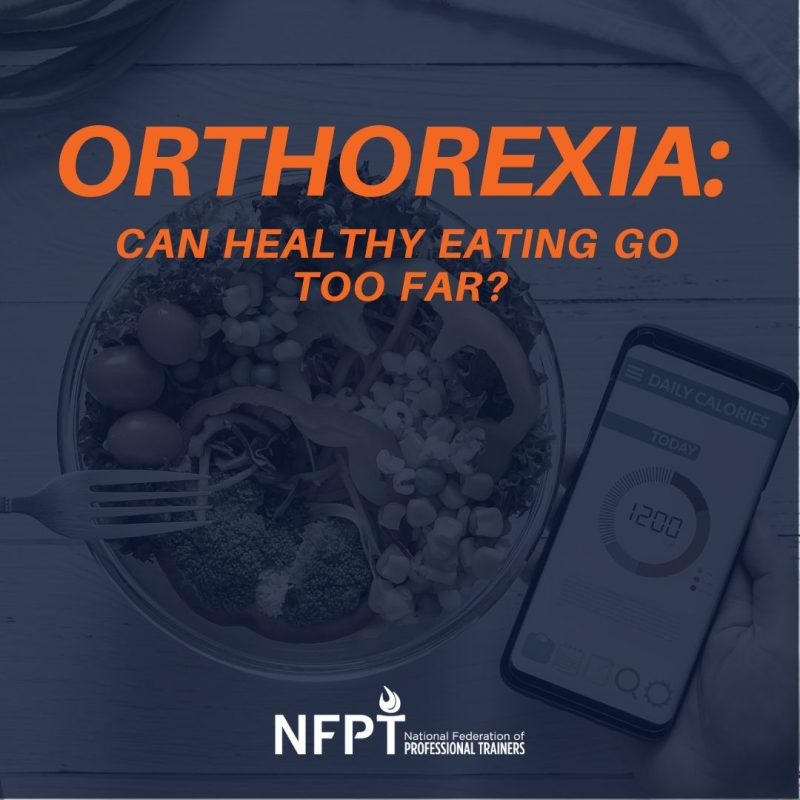
Might your personal training clients be exhibiting behaviors aligned with orthorexia?
We love to see our personal training clients thriving and prioritizing their health and well-being in whatever ways serve them the best. But for some of our clients, healthy eating can become an obsession; just like anything else, it can be taken too far. They may obsess over nutritional practices through constant calorie counting, weighing food, and compulsively reading food labels. Can so-called “healthy” eating be taken too far? Personal trainers should be aware of the signs of orthorexia and its unintended consequences.
Orthorexia, coined in the 1990s, is an eating disorder characterized by compulsive habits, eating “pure” or “clean” foods, extreme restriction, hyper-fixation with nutrition, rigidity in daily eating habits, and/or cutting out entire food groups in the name of “eating healthy”. As professionals, we need to remain attuned with our clients’ habits, and be able to tell the difference between a commitment to healthy eating and potentially dangerous health-behavior patterns.
Comparison Time
| Healthy Habit | Compulsive Practices |
| Thoughtful meal planning, but allowing room for flexibility and change
|
Rigid meal planning with no room for flexibility or nuance
|
| Selecting mostly unprocessed food options when possible and taking a food-first approach
|
Obsessively selecting only products that fit the client’s definition of “clean” or “safe”
|
| Demonstrating an appreciation and respect for all macronutrients
|
Strict elimination of a particular food group due to a perceived, (non-research supported) benefit
|
| Client can thoughtfully troubleshoot when confronted with challenges or a scheduling conflict that requires a shift in eating practices
|
Client experiences emotional turbulence if any obstacle or schedule challenge does not allow for them to stick to their strict schedule of eating
|
| Client does not appear to be experiencing disturbances in their overall health due to eating practices
|
Client appears to be experiencing a decline in performance, digestive disorders, anemia, significant weight loss/muscle mass reduction
|
| Mindfully observing caloric intake and exercise | Religiously tracking every food and beverage item and/or obsessively calculating macronutrient ranges. |
| Eating foods in balance and enjoying all foods |
Strictly sticking to a specific macronutrient or caloric window and avoiding any foods the client deems “bad” or “unclean”. |
| Continuing to enjoy social gatherings |
May avoid social gatherings as the food choices will likely not align with the client’s perceived needs and preferences. |
| Client does not generally experience food guilt or shame related to a food choice or set of choices
|
Client may feel extreme guilt or share or stress after eating any food classified as “unhealthy” in their mind
|
| Client can modify food choices when preferred options are not readily available
|
Client experiences extreme anxiety when preferred options are not available
|
| Does not think about food 24-7 | Food is a dominating thought in the client’s mind |
Health Consequences of Orthorexia
When someone is dealing with orthorexia, they typically experience malnutrition (from cutting out a food group or severely limiting intake), calorie deficits and weight loss, anxiety, and social isolation. Each of those can lead to further negative outcomes.
Orthorexia often starts out as a well-intended desire to just eat better, improve nutrient intake, and balance meals. We know part of the “formula” for living a healthy life is being mindful of nutritional practices but doing so in balance and not at the risk of sacrificing joy or one’s sanity.
This obsessive focus on food requires intervention that is outside our scope of practice to address. As a health and exercise professional, if you suspect a client may be struggling with this, lean on professionals in your referral network to provide additional support for that client. Most often this will be a primary care provider and mental health professional.
It’s important to talk with your clients about nutrition and not just as an overarching concept, but the practices they engage in. We will likely be their first line of defense should their well-intended efforts land somewhere else and they spiral into an obsessive pattern. Be aware. Stay aware.







